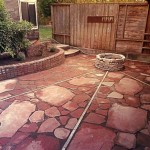How to Make Cement for Patio Slabs: A Step-by-Step Guide
Transforming your outdoor space with beautiful and durable patio slabs is a rewarding project achievable with the right knowledge and materials. Cement, a crucial component of patio slabs, plays a vital role in their strength and longevity. This comprehensive guide will provide you with the essential steps and insights to create high-quality cement for your patio slabs, ensuring a long-lasting and attractive outdoor enhancement.
Gather the Necessary Materials
Before embarking on this project, ensure you have all the necessary materials:
- Portland cement
- Sand
- Gravel
- Water
- Concrete mixer (optional)
- Bucket
- Shovel
- Trowel
Determine the Cement Mix Ratio
The ideal ratio for cement, sand, and gravel varies depending on the intended use and desired strength. For patio slabs, a common ratio is 1:2:3 (one part cement, two parts sand, and three parts gravel). This ratio provides a solid and durable base for your slabs.
Mix the Dry Ingredients
Begin by thoroughly mixing the dry ingredients—cement, sand, and gravel—in a large container or on a flat surface. Use a shovel to mix the materials until they are evenly distributed and free of any clumps or lumps.
Add Water Gradually
Once the dry ingredients are well mixed, start adding water gradually. Add small amounts of water at a time while mixing the mixture consistently. The goal is to achieve a workable consistency that is neither too wet nor too dry. The ideal consistency should resemble damp soil, pliable enough to mold and shape without being runny.
Mix the Cement
Mix the cement thoroughly until it has a uniform color and consistency. Mixing can be done manually with a shovel or a hoe in a large container. If you have a concrete mixer, it will significantly reduce the mixing time and effort.
Test the Consistency
To ensure the cement is at the right consistency, perform a simple test. Form a small ball of cement and gently toss it from a height of about 3 feet (0.9 meters). If the ball loosely breaks into several pieces, the consistency is correct. If it remains intact, add a small amount of water and mix again. If it crumbles easily, add some dry mixture.
Pour the Cement
When the cement is ready, pour it into the prepared forms. Spread the cement evenly, making sure there are no air pockets or voids. Use a trowel or screed to level off the surface and create a smooth finish.
Cure the Cement
After pouring the cement, it is essential to let it cure properly. Curing allows the cement to gain strength and reach its full potential. Keep the surface moist by spraying it with water several times a day for the first few days. Cover the slabs with plastic sheeting or damp burlap to prevent moisture loss and promote even curing.
Follow-Up Care
Once the slabs have cured sufficiently (usually around 7 days), you can remove the forms and allow them to continue curing for at least 28 days. In colder climates, protect the slabs from freezing temperatures during the curing process.
By following these steps and using the correct mix ratio, you can create high-quality cement that will form the foundation of durable and visually appealing patio slabs. Enjoy the satisfaction of enhancing your outdoor space with your own handcrafted cement creations.

Diy Concrete Patio In 8 Easy Steps How To Pour A Cement Slab

How To Plan Pour Your Diy Concrete Patio Liberty Ready Mix

How To Build And Lay A Patio Marshalls

How Much Mortar Sand Cement You Need To Lay A Patio Thinkup Garden

Diy Concrete Patio How To Pour A Slab Bob Vila

Diy Concrete Patio How To Pour Your Own Slab Bn S

Lay Your Patio Step By Driveway Paving Dublin Contractor Granite Patios Gravel

How To Lay Paving Slabs For Your Patio Simply

How To Lay A Patio On Concrete Or Over Paving Marshalls

How To Prepare A Site For Concrete Base Forms And Rebar
Related Posts








